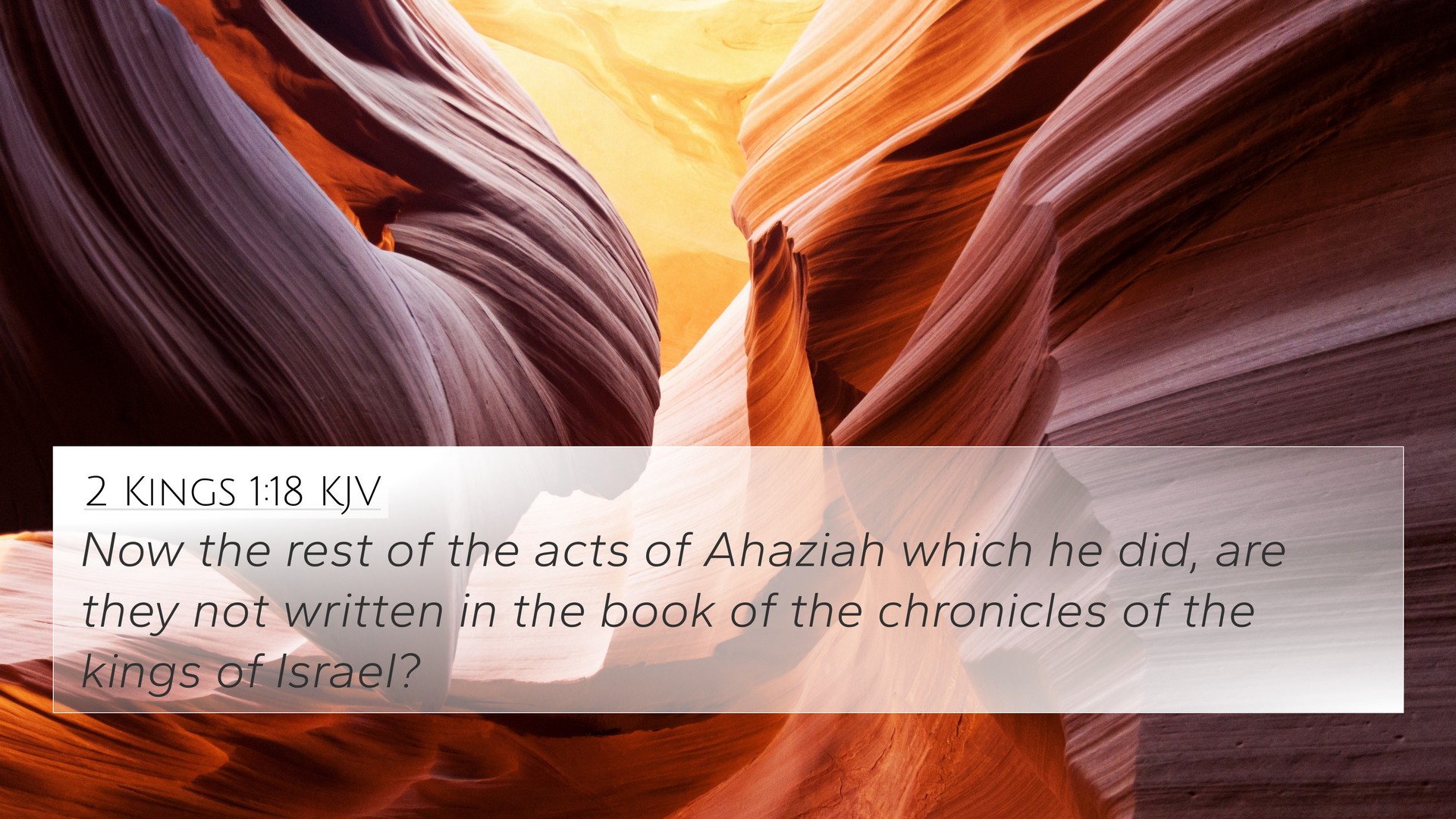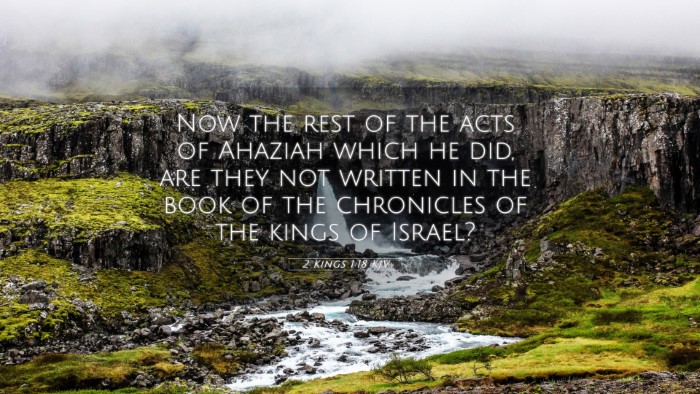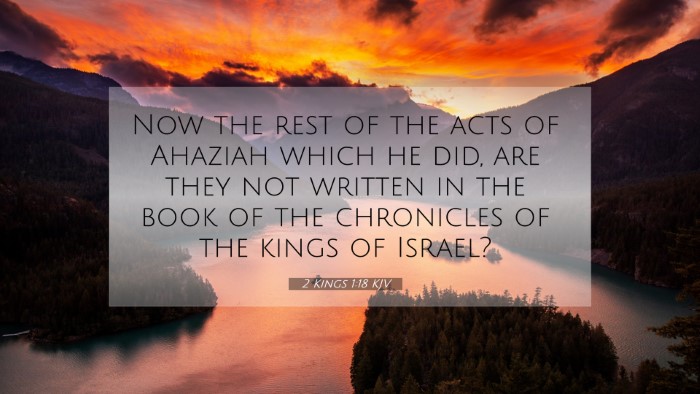Old Testament
Genesis Exodus Leviticus Numbers Deuteronomy Joshua Judges Ruth 1 Samuel 2 Samuel 1 Kings 2 Kings 1 Chronicles 2 Chronicles Ezra Nehemiah Esther Job Psalms Proverbs Ecclesiastes Song of Solomon Isaiah Jeremiah Lamentations Ezekiel Daniel Hosea Joel Amos Obadiah Jonah Micah Nahum Habakkuk Zephaniah Haggai Zechariah Malachi2 Kings 1:18 Similar Verses
2 Kings 1:18 Cross References
Now the rest of the acts of Ahaziah which he did, are they not written in the book of the chronicles of the kings of Israel?
Uncover the Rich Themes and Topics of This Bible Verse
Listed below are the Bible themes associated with 2 Kings 1:18. We invite you to explore each theme to gain deeper insights into the Scriptures.
2 Kings 1:18 Cross Reference Verses
This section features a detailed cross-reference designed to enrich your understanding of the Scriptures. Below, you will find carefully selected verses that echo the themes and teachings related to 2 Kings 1:18 KJV. Click on any image to explore detailed analyses of related Bible verses and uncover deeper theological insights.
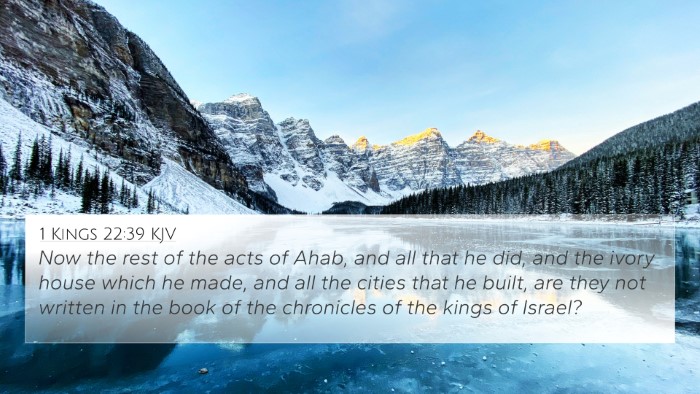
1 Kings 22:39 (KJV) »
Now the rest of the acts of Ahab, and all that he did, and the ivory house which he made, and all the cities that he built, are they not written in the book of the chronicles of the kings of Israel?
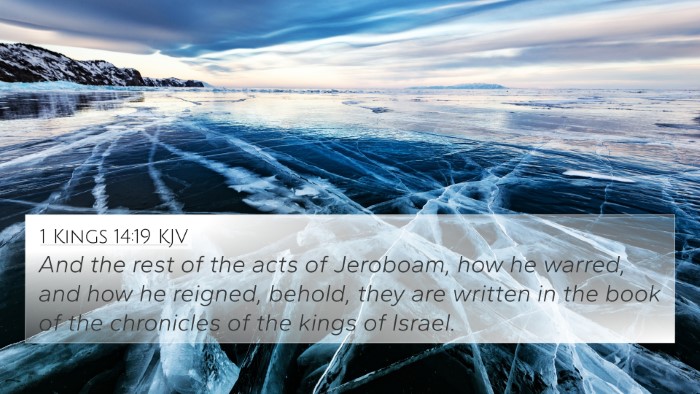
1 Kings 14:19 (KJV) »
And the rest of the acts of Jeroboam, how he warred, and how he reigned, behold, they are written in the book of the chronicles of the kings of Israel.
2 Kings 1:18 Verse Analysis and Similar Verses
Understanding 2 Kings 1:18
Verse: 2 Kings 1:18 - "Now the rest of the acts of Ahaziah, which he did, are they not written in the book of the chronicles of the kings of Israel?”
Context and Interpretation
This verse serves as a concluding remark regarding the reign of Ahaziah, the king of Israel, and invites readers to look into the historical records (the Chronicles) for more details about his actions and reign.
Key Themes
- Historical Record: The mention of the "book of the chronicles" suggests a systematic documentation of Israel's kings, emphasizing the importance of historical context in understanding biblical narratives.
- Reflection on Leadership: Ahaziah's brief mention highlights the need for leaders to be mindful of their legacy, a recurrent theme in biblical literature.
- Prophetic Fulfillment: The prophets addressed in earlier narratives foreshadowed the outcomes associated with disobedience to God, which are further explored in Ahaziah's story.
Commentary Insights
Insights from public domain commentaries provide a multi-faceted understanding of this verse:
- Matthew Henry:
Henry indicates that this verse exemplifies the brevity of Ahaziah’s reign, showcasing his lack of significant achievements. He suggests that the listing of kings' acts in chronicles provides a moral commentary on their lives and their spiritual fidelity.
- Albert Barnes:
Barnes emphasizes that the phrase highlights God’s sovereignty and the importance of recorded history in guiding future generations. He sees it as a direct appeal to reference the chronicles for deeper insight into the character and actions of Ahaziah.
- Adam Clarke:
Clarke asserts that referencing the chronicles indicates the importance of historical accounts in establishing the truth of biblical narratives, reinforcing the idea that God's plan unfolds through recorded history.
Bible Cross References
Understanding 2 Kings 1:18 can be enriched by exploring various cross-referenced Bible verses. Here are some key related verses:
- 1 Kings 16:29-33: Details the reign of Ahaziah’s father, Ahab, which creates a context for understanding his heritage.
- 2 Kings 8:25-27: Dives into the reign of Ahaziah and reflects on the consequences of his leadership.
- 2 Chronicles 21:12-20: Refers to the calamities that befell Jehoram, Ahaziah’s brother, emphasizing the interplay of kings in Israel's history.
- Isaiah 1:1: Provides insight into the historical context and prophetic timelines during Ahaziah’s reign, establishing the backdrop of prophetic ministry.
- Jeremiah 22:10-12: Discusses the fate of kings in Judah, which complements an understanding of the consequences of disobedience in leadership.
- 1 Timothy 5:24: Speaks to the idea of public deeds either becoming known or hidden, which connects to the concept of historical records.
- Malachi 4:5-6: Offers insights into the prophetic message context during the times of kings and their impact on Israelite worship and community.
Thematic Connections
The narrative of Ahaziah ties into broader themes across scripture, which can serve as a guide for cross-referencing:
- Leadership and Accountability: Throughout the Bible, the actions of leaders are critically examined, as seen in Exodus 18:21 and Proverbs 29:2.
- The Role of Prophets: The prophetic voice is pivotal to the narrative in the books of the Kings, linking to verses such as 1 Samuel 3:19 and Amos 3:7 which speak on God revealing His plans through prophets.
- Judgment and Mercy: The tension of judgment against kings is a recurring theme, as reflected in 2 Chronicles 36:15-16.
Tools and Resources for Further Study
For those seeking to dive deeper into the connections between Bible verses and their interpretations, consider utilizing:
- Bible Concordance: A tool to find key terms and their locations within the scripture for effective cross-referencing.
- Bible Cross-Reference Guide: Guides that can assist in identifying relationships between different scripture passages.
- Cross-Reference Bible Study: Methods focused on exploring thematic and doctrinal continuity throughout the Bible.
- Comprehensive Bible Cross-Reference Materials: Resources that compile extensive cross-references for preachers and teachers.
User Intent and Search Queries
For those wondering how to navigate scriptures in a meaningful way, consider the following queries:
- What verses are related to 2 Kings 1:18?
- Find cross-references for 2 Kings 1:18:
- How do 1 Kings 16:29 and 2 Kings 1:18 connect?
- Similarities between Ahaziah and his father, Ahab, in terms of legacy.
- Bible verses that support the historical understanding of Israel's kings.
Conclusion
This multifaceted analysis of 2 Kings 1:18, supported through public domain commentaries, cross-references, and thematic connections, provides a comprehensive understanding of the verse. The reminders of accountability and the significance of recording our actions are threads that echo through Scripture, urging a reflective approach to both leadership and personal conduct.
